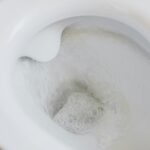Using Drano might seem like a quick fix for your clogged drains, but it can actually be harmful to your plumbing. The harsh chemicals can corrode older pipes, leading to leaks and costly repairs. Plus, the heat generated during its use adds even more stress to your plumbing system. So, what are the safer alternatives that can effectively clear your clogs without causing damage? Let’s explore some better options.
Understanding How Drano Works
When you’re dealing with a clogged drain, understanding how Drano works can help you make an informed choice about its use.
Drano contains powerful chemicals like sodium hydroxide and sodium nitrate that create heat when mixed with water. This heat helps break down organic materials, such as hair and grease, allowing them to flow freely down the drain.
When you pour Drano into a clogged drain, it reacts quickly, dissolving the blockage. However, it’s crucial to follow the instructions carefully and allow enough time for the solution to work.
While it can be effective, consider that repeated use might lead to more significant plumbing issues in the long run. Always weigh your options before reaching for that bottle.
The Dangers of Using Drano on Your Pipes
Although Drano can be effective at clearing clogs, using it on your pipes can lead to serious damage over time. The harsh chemicals in Drano can corrode your plumbing, especially if you have older pipes made of PVC or metal.
Over time, this corrosion weakens the structure, leading to leaks and costly repairs. Additionally, the heat generated by the chemical reactions can cause further stress on your pipes.
If you frequently rely on Drano, you’re not addressing the underlying issues causing the clogs, which can lead to more serious plumbing problems down the line.
Instead, consider safer alternatives like baking soda and vinegar or enzyme-based cleaners that won’t harm your pipes and effectively tackle clogs. Your plumbing will thank you!
Signs of Pipe Damage From Chemical Drain Cleaners
If you’ve been using chemical drain cleaners like Drano, it’s crucial to recognize the signs of potential damage to your pipes.
First, watch for slow drainage; this could indicate a buildup of corrosive materials.
Next, listen for unusual noises, like gurgling or bubbling, which may signal air trapped in your pipes due to deterioration.
You might also notice leaks or water stains around fittings and joints—these are clear warnings that something’s wrong.
Additionally, check for discoloration or rust on your pipes, as this suggests corrosion from harsh chemicals.
Lastly, if you smell foul odors, it could mean that the chemicals are breaking down your pipes’ protective layers.
If you spot any of these signs, it’s time to reassess your cleaning methods.
Eco-Friendly Alternatives to Drano
Recognizing the signs of pipe damage from chemical drain cleaners is an important step towards maintaining your plumbing.
If you’re looking for eco-friendly alternatives to Drano, consider using baking soda and vinegar. This powerful duo not only breaks down clogs but also deodorizes your pipes. Just pour half a cup of baking soda down the drain, followed by half a cup of vinegar. Let it fizz for about 30 minutes, then flush with hot water.
Another option is using a mixture of salt and boiling water, which can help clear minor blockages. You can also try enzyme-based drain cleaners, which are safer for your pipes and the environment.
These alternatives keep your plumbing healthy while being kinder to the planet!
Effective DIY Methods for Clearing Clogs
When your drains start to back up, you can tackle the issue with some effective DIY methods that don’t require harsh chemicals.
First, try using a plunger; it’s simple yet often effective for clearing minor clogs. If that doesn’t work, mix equal parts baking soda and vinegar, pour it down the drain, and let it fizz for 30 minutes before flushing with hot water.
For tougher clogs, a plumber’s snake can help dislodge debris. You can also remove the drain cover and clear out any visible buildup by hand.
Lastly, boiling water can help dissolve grease and soap scum. With these methods, you’ll keep your drains flowing smoothly without resorting to damaging chemicals.
When to Call a Professional Plumber
How do you know when it’s time to call a professional plumber? If you’ve tried multiple DIY methods to clear a clog, and nothing’s working, it’s a sign you need expert help.
A persistent leak or water pooling under your sink could indicate a bigger issue that requires immediate attention. Additionally, if you notice strange noises from your pipes or water backing up in different fixtures, don’t hesitate to call a professional.
Also, if there’s a foul odor coming from your drains, it might signal a serious problem. Avoid risking further damage by waiting too long.
Trust your instincts—if something feels off, getting a plumber on the job is often the best course of action.
Preventative Measures for Clog Prevention
To keep your drains flowing smoothly and prevent clogs, regularly practicing good habits can make a significant difference.
Start by using drain screens to catch hair and debris before they enter your pipes. You should also avoid pouring grease, oil, or food scraps down the sink; instead, dispose of them in the trash.
Running hot water down the drain after each use helps flush away residue. Additionally, once a month, consider using a mixture of baking soda and vinegar to naturally break down buildup.
Lastly, be mindful of what you flush; only toilet paper should go down the toilet.
Understanding Your Plumbing System’s Needs
Understanding your plumbing system’s needs is essential for maintaining its efficiency and longevity. Start by familiarizing yourself with the layout of your pipes and fixtures. Know where potential blockages are likely to occur, like bends and junctions.
Regularly inspect your system for leaks or signs of wear, and don’t ignore small issues; they can lead to bigger problems down the line.
Consider the materials of your pipes; older systems made from galvanized steel may require different care than modern PVC. Use gentle cleaning methods, such as baking soda and vinegar, instead of harsh chemicals like Drano, which can damage your pipes.
Conclusion
In conclusion, while Drano might seem like a quick fix for clogs, its harsh chemicals can seriously damage your plumbing. Instead, opt for eco-friendly alternatives like baking soda and vinegar, or try effective DIY methods for a safer approach. Regular maintenance and understanding your plumbing system’s needs can help prevent future issues. If you’re ever in doubt or facing persistent clogs, don’t hesitate to call a professional plumber for assistance. Your pipes will thank you!


